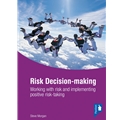Risk and Leadership
 Monday, April 8, 2013 at 9:31PM
Monday, April 8, 2013 at 9:31PM Leadership is often lacking, and management is all too often to the fore where considerations of risk are concerned in health and social care agencies. In this scenario fear and back-covering hold the attention, while good practice is presented as an unconvincing façade. Managers strangely play down any questions about excessive bureaucracy while still demanding all the paperwork is completed as the primary target. If something goes wrong it is the paperwork that gets sole attention, and real practice considerations are relegated to a place somewhere to the right of obscurity.
'Good paperwork is a sign of good practice' becomes the convenient smokescreen. This would be true if there was less management and more supportive leadership, as the need for paperwork would be put into perspective: as the essential minimum to support good practice not to hinder it. Good tools are a range of checklists and formats that have been shaped by good practice, and thus they are able to guide and prompt firstly, and capture good practice as a secondary function.
The Risk Decision-Making publication is the update of 17 years of working with individual practitioners and teams across countless organisations, both from within the Sainsbury Centre for Mental Health initially and through the Practice Based Evidence consultancy since 2001. The tools and guidance are informed by what we know from the national and international research, but more significantly through the practice based evidence of hundreds of practitioners across all disciplines and service sectors. Most importantly, this publication refocuses the attention on risk as everyone’s business; so it is structured throughout to address issues from the perspective of individual’s, teams and the leadership & management of organisations. Whatever systems your leaders have bought or put into place there is still a role for guidance on best practice, so look no further.
 leadership,
leadership,  risk,
risk,  risk management in
risk management in  Positive risk-taking
Positive risk-taking 







